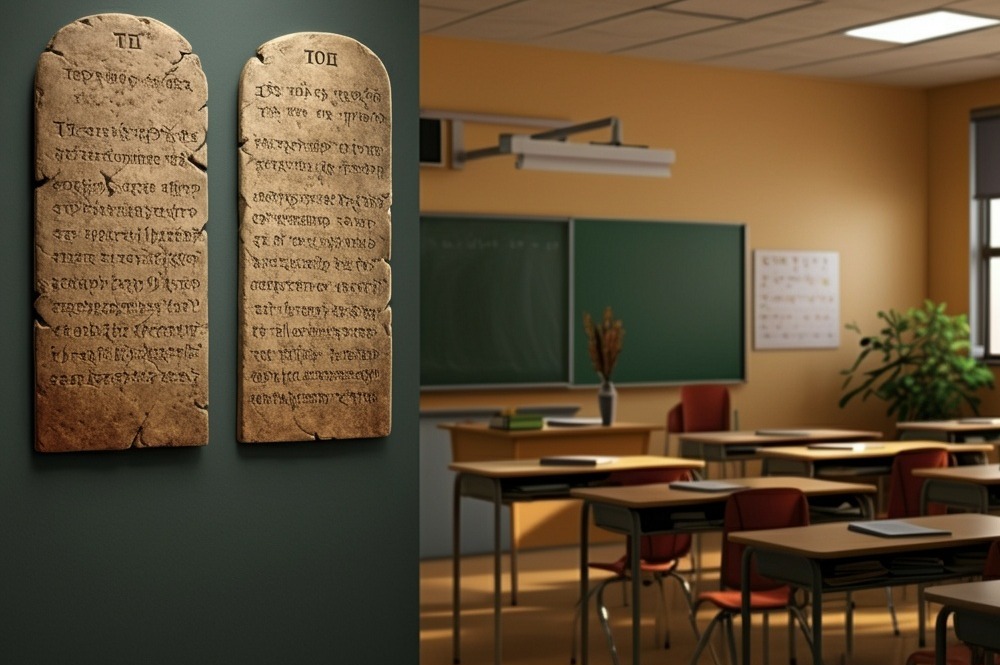Originally published by The 19th.
The nine multifaith families who sued over a Louisiana law requiring the Ten Commandments to be posted in all public school classrooms are celebrating a federal district court ruling on Tuesday that found H.B. 71 to be unconstitutional.
Enacted in June, the legislation mandates that schools permanently display a Protestant version of the Judeo-Christian code of conduct, but a preliminary injunction issued by the U.S. District Court for the Middle District of Louisiana on Tuesday will stop its implementation.
The injunction takes effect immediately, even though the defendants are appealing the decision.
Civil liberties advocates say that ignoring church-state separation in schools not only violates the Constitution by imposing religion on students but also risks exposing young people to harmful stereotypes about gender, race and the LGBTQ+ community. The Bible could be used to teach girls that wives must obey their husbands or to limit girls’ ambitions for their lives, they say. President-elect Donald Trump, however, plans to incorporate prayer into public education, according to his Agenda 47. It’s unclear if the courts will allow schools to implement his policy proposal.
The plaintiffs in Rev. Roake v. Brumley include the Rev. Darcy Roake and her husband, Adrian Van Young. The families represented are of Unitarian Universalist, Christian, Jewish and nonreligious backgrounds. The defendants include Cade Brumley, Louisiana’s state superintendent of education, and several state and local school officials.
In a statement, Roake said:
“H.B. 71 is a direct infringement of our religious-freedom rights, and we’re pleased and relieved that the court ruled in our favor.”
“As an interfaith family, we expect our children to receive their secular education in public school and their religious education at home and within our faith communities, not from government officials.”
Judge John W. DeGravelles found that the law violated the First Amendment along with years of Supreme Court precedent. In 1980, the high court ruled in Stone v. Graham that a Kentucky statute ordering the display of the Ten Commandments in public school classrooms was unconstitutional. The First Amendment’s Establishment Clause bars the government from “establishing” a religion.
“First, Stone remains good law and is directly on point, and this Court is bound to follow it,” DeGravelles wrote in his opinion. “Second, even putting Stone aside . . . Plaintiffs have adequately alleged that H.B. 71 fails to comply with the Establishment Clause.”
DeGravelles said that requiring the commandments to be posted in all classrooms year-round, regardless of course content or grade level, would…
…make schoolchildren a “captive audience” and coerce them “to participate in a religious exercise.”
Liz Murrill, the state’s Republican attorney general, said in a statement: “We strongly disagree with the court’s decision and will immediately appeal.”
The plaintiffs in Roake v. Brumley, who have children in public schools, are represented by the national ACLU, ACLU of Louisiana, Americans United for Separation of Church and State, and the Freedom From Religion Foundation. The law firm Simpson Thacher & Bartlett LLP is involved as pro bono counsel.
Alanah Odoms, executive director of the ACLU of Louisiana, said in a statement:
“Religious freedom — the right to choose one’s faith without pressure — is essential to American democracy.”
“Today’s ruling ensures that the schools our plaintiffs’ children attend will stay focused on learning, without promoting a state-preferred version of Christianity.”
Rachel Laser, president and CEO of Americans United for Separation of Church and State, said in a statement that the ruling will ensure that families, and not politicians, choose how their children engage with religion.
“It should send a strong message to Christian nationalists across the country that they cannot impose their beliefs on our nation’s public school children,” Laser said. “Not on our watch.”
***
Nadra Nittle, is The 19th’s education reporter and a free lance journalist. Her work has appeared in the Los Angeles Times, El Paso Times, the Santa Fe Reporter and the Press-Telegram and online publications Vox and Civil Eats. Nittle also freelanced for The Guardian, Business Insider, Huffington Post, BBC News and NBC News.
The 19th — named after the 19th amendment to the U.S. Constitution — is an independent, nonprofit newsroom reporting on gender, politics and policy. Their goal is to empower women and LGBTQ+ people — particularly those from underrepresented communities — with the information, resources and tools they need to be equal participants in our democracy. Subscribe to their daily newsletter.




























